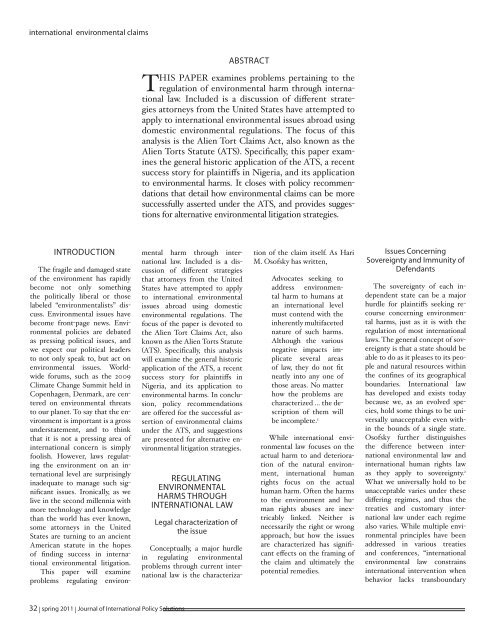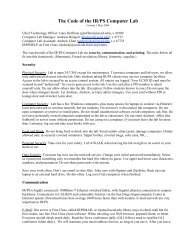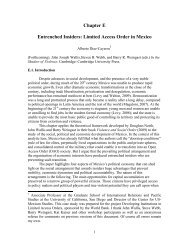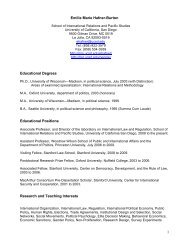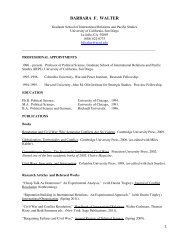to download the full journal. (1.2MB PDF) - School of International ...
to download the full journal. (1.2MB PDF) - School of International ...
to download the full journal. (1.2MB PDF) - School of International ...
You also want an ePaper? Increase the reach of your titles
YUMPU automatically turns print PDFs into web optimized ePapers that Google loves.
international environmental claims<br />
ABSTRACT<br />
THIS PAPER examines problems pertaining <strong>to</strong> <strong>the</strong><br />
regulation <strong>of</strong> environmental harm through international<br />
law. Included is a discussion <strong>of</strong> different strategies<br />
at<strong>to</strong>rneys from <strong>the</strong> United States have attempted <strong>to</strong><br />
apply <strong>to</strong> international environmental issues abroad using<br />
domestic environmental regulations. The focus <strong>of</strong> this<br />
analysis is <strong>the</strong> Alien Tort Claims Act, also known as <strong>the</strong><br />
Alien Torts Statute (ATS). Specifically, this paper examines<br />
<strong>the</strong> general his<strong>to</strong>ric application <strong>of</strong> <strong>the</strong> ATS, a recent<br />
success s<strong>to</strong>ry for plaintiffs in Nigeria, and its application<br />
<strong>to</strong> environmental harms. It closes with policy recommendations<br />
that detail how environmental claims can be more<br />
success<strong>full</strong>y asserted under <strong>the</strong> ATS, and provides suggestions<br />
for alternative environmental litigation strategies.<br />
INTRODUCTION<br />
The fragile and damaged state<br />
<strong>of</strong> <strong>the</strong> environment has rapidly<br />
become not only something<br />
<strong>the</strong> politically liberal or those<br />
labeled “environmentalists” discuss.<br />
Environmental issues have<br />
become front-page news. Environmental<br />
policies are debated<br />
as pressing political issues, and<br />
we expect our political leaders<br />
<strong>to</strong> not only speak <strong>to</strong>, but act on<br />
environmental issues. Worldwide<br />
forums, such as <strong>the</strong> 2009<br />
Climate Change Summit held in<br />
Copenhagen, Denmark, are centered<br />
on environmental threats<br />
<strong>to</strong> our planet. To say that <strong>the</strong> environment<br />
is important is a gross<br />
understatement, and <strong>to</strong> think<br />
that it is not a pressing area <strong>of</strong><br />
international concern is simply<br />
foolish. However, laws regulating<br />
<strong>the</strong> environment on an international<br />
level are surprisingly<br />
inadequate <strong>to</strong> manage such significant<br />
issues. Ironically, as we<br />
live in <strong>the</strong> second millennia with<br />
more technology and knowledge<br />
than <strong>the</strong> world has ever known,<br />
some at<strong>to</strong>rneys in <strong>the</strong> United<br />
States are turning <strong>to</strong> an ancient<br />
American statute in <strong>the</strong> hopes<br />
<strong>of</strong> finding success in international<br />
environmental litigation.<br />
This paper will examine<br />
problems regulating environmental<br />
harm through international<br />
law. Included is a discussion<br />
<strong>of</strong> different strategies<br />
that at<strong>to</strong>rneys from <strong>the</strong> United<br />
States have attempted <strong>to</strong> apply<br />
<strong>to</strong> international environmental<br />
issues abroad using domestic<br />
environmental regulations. The<br />
focus <strong>of</strong> <strong>the</strong> paper is devoted <strong>to</strong><br />
<strong>the</strong> Alien Tort Claims Act, also<br />
known as <strong>the</strong> Alien Torts Statute<br />
(ATS). Specifically, this analysis<br />
will examine <strong>the</strong> general his<strong>to</strong>ric<br />
application <strong>of</strong> <strong>the</strong> ATS, a recent<br />
success s<strong>to</strong>ry for plaintiffs in<br />
Nigeria, and its application <strong>to</strong><br />
environmental harms. In conclusion,<br />
policy recommendations<br />
are <strong>of</strong>fered for <strong>the</strong> successful assertion<br />
<strong>of</strong> environmental claims<br />
under <strong>the</strong> ATS, and suggestions<br />
are presented for alternative environmental<br />
litigation strategies.<br />
REGULATING<br />
ENVIRONMENTAL<br />
HARMS THROUGH<br />
INTERNATIONAL LAW<br />
Legal characterization <strong>of</strong><br />
<strong>the</strong> issue<br />
Conceptually, a major hurdle<br />
in regulating environmental<br />
problems through current international<br />
law is <strong>the</strong> characterization<br />
<strong>of</strong> <strong>the</strong> claim itself. As Hari<br />
M. Os<strong>of</strong>sky has written,<br />
Advocates seeking <strong>to</strong><br />
address environmental<br />
harm <strong>to</strong> humans at<br />
an international level<br />
must contend with <strong>the</strong><br />
inherently multifaceted<br />
nature <strong>of</strong> such harms.<br />
Although <strong>the</strong> various<br />
negative impacts implicate<br />
several areas<br />
<strong>of</strong> law, <strong>the</strong>y do not fit<br />
neatly in<strong>to</strong> any one <strong>of</strong><br />
those areas. No matter<br />
how <strong>the</strong> problems are<br />
characterized … <strong>the</strong> description<br />
<strong>of</strong> <strong>the</strong>m will<br />
be incomplete. 1<br />
While international environmental<br />
law focuses on <strong>the</strong><br />
actual harm <strong>to</strong> and deterioration<br />
<strong>of</strong> <strong>the</strong> natural environment,<br />
international human<br />
rights focus on <strong>the</strong> actual<br />
human harm. Often <strong>the</strong> harms<br />
<strong>to</strong> <strong>the</strong> environment and human<br />
rights abuses are inextricably<br />
linked. Nei<strong>the</strong>r is<br />
necessarily <strong>the</strong> right or wrong<br />
approach, but how <strong>the</strong> issues<br />
are characterized has significant<br />
effects on <strong>the</strong> framing <strong>of</strong><br />
<strong>the</strong> claim and ultimately <strong>the</strong><br />
potential remedies.<br />
Issues Concerning<br />
Sovereignty and Immunity <strong>of</strong><br />
Defendants<br />
The sovereignty <strong>of</strong> each independent<br />
state can be a major<br />
hurdle for plaintiffs seeking recourse<br />
concerning environmental<br />
harms, just as it is with <strong>the</strong><br />
regulation <strong>of</strong> most international<br />
laws. The general concept <strong>of</strong> sovereignty<br />
is that a state should be<br />
able <strong>to</strong> do as it pleases <strong>to</strong> its people<br />
and natural resources within<br />
<strong>the</strong> confines <strong>of</strong> its geographical<br />
boundaries. <strong>International</strong> law<br />
has developed and exists <strong>to</strong>day<br />
because we, as an evolved species,<br />
hold some things <strong>to</strong> be universally<br />
unacceptable even within<br />
<strong>the</strong> bounds <strong>of</strong> a single state.<br />
Os<strong>of</strong>sky fur<strong>the</strong>r distinguishes<br />
<strong>the</strong> difference between international<br />
environmental law and<br />
international human rights law<br />
as <strong>the</strong>y apply <strong>to</strong> sovereignty. 2<br />
What we universally hold <strong>to</strong> be<br />
unacceptable varies under <strong>the</strong>se<br />
differing regimes, and thus <strong>the</strong><br />
treaties and cus<strong>to</strong>mary international<br />
law under each regime<br />
also varies. While multiple environmental<br />
principles have been<br />
addressed in various treaties<br />
and conferences, “international<br />
environmental law constrains<br />
international intervention when<br />
behavior lacks transboundary<br />
32 | spring 2011 | Journal <strong>of</strong> <strong>International</strong> Policy Solutions


